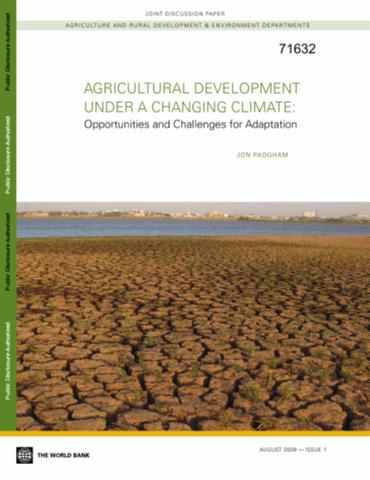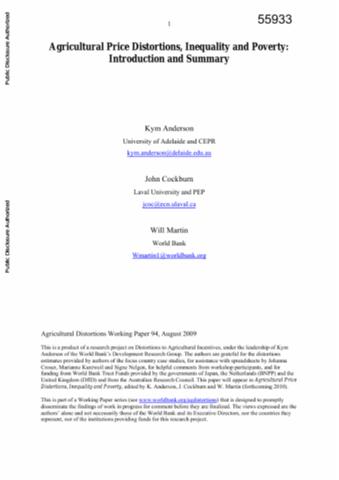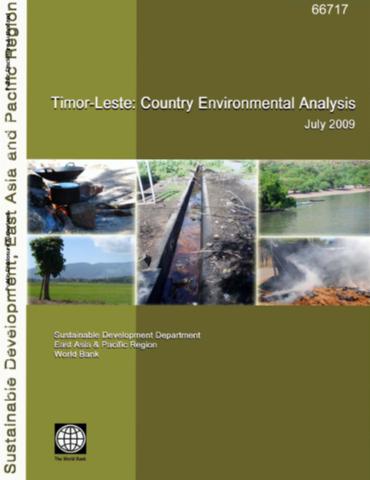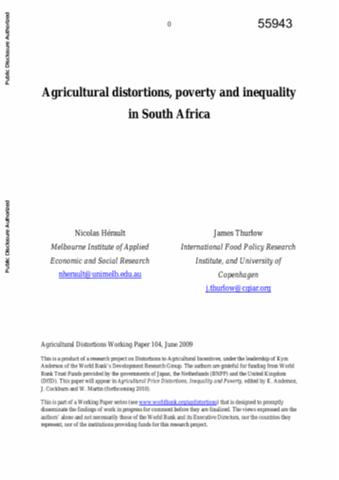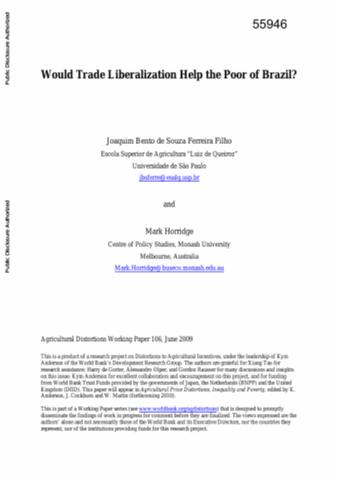The World Bank is a vital source of financial and technical assistance to developing countries around the world. We are not a bank in the ordinary sense but a unique partnership to reduce poverty and support development. The World Bank Group has two ambitious goals: End extreme poverty within a generation and boost shared prosperity.
- To end extreme poverty, the Bank's goal is to decrease the percentage of people living on less than $1.25 a day to no more than 3% by 2030.
- To promote shared prosperity, the goal is to promote income growth of the bottom 40% of the population in each country.
The World Bank Group comprises five institutions managed by their member countries.
The World Bank Group and Land: Working to protect the rights of existing land users and to help secure benefits for smallholder farmers
The World Bank (IBRD and IDA) interacts primarily with governments to increase agricultural productivity, strengthen land tenure policies and improve land governance. More than 90% of the World Bank’s agriculture portfolio focuses on the productivity and access to markets by small holder farmers. Ten percent of our projects focus on the governance of land tenure.
Similarly, investments by the International Finance Corporation (IFC), the World Bank Group’s private sector arm, including those in larger scale enterprises, overwhelmingly support smallholder farmers through improved access to finance, inputs and markets, and as direct suppliers. IFC invests in environmentally and socially sustainable private enterprises in all parts of the value chain (inputs such as irrigation and fertilizers, primary production, processing, transport and storage, traders, and risk management facilities including weather/crop insurance, warehouse financing, etc
For more information, visit the World Bank Group and land and food security (https://www.worldbank.org/en/topic/agriculture/brief/land-and-food-security1
Resources
Displaying 4711 - 4715 of 4907Agricultural Development under a Changing Climate
Climate change presents a profound challenge to food security and development. Negative impacts from climate change are likely to be greatest in regions that are currently food insecure and may even be significant in those regions that have made large gains in reducing food insecurity over the past half-century. Adaptation in the agricultural sector is being given a high priority within this effort because of the inherent sensitivity of food production to climate and the strong inter-linkages that exist between climate, agriculture, and economic growth and development.
Agricultural Price Distortions, Inequality, and Poverty
Reforms in recent decades have sharply reduced the distortions affecting agriculture in developing countries, particularly by cuts to agricultural export taxes and by some reductions in government assistance to agriculture in high-income countries, but international trade in farm products continues to be far more distorted than trade in nonfarm goods. This paper summarizes a series of empirical studies that focus on the effects of the remaining distortions to world merchandise trade for poverty and inequality, especially in developing countries.
Timor-Leste
The Country Environmental Analysis (CEA) for Timor-Leste identifies environmental priorities through a systematic review of environmental issues in natural resources management and environmental health in the context of the country's economic development and environmental institutions. Lack of data has been the main limitation in presenting a more rigorous analysis. Nevertheless, the report builds on the best available secondary data, presents new data on the country's wealth composition, and derives new results on the costs of water and air pollution.
Agricultural Distortions, Poverty, and Inequality in South Africa
South Africa has rapidly reduced trade barriers since the end of Apartheid, yet agricultural production and exports have remained sluggish. Also, poverty and unemployment have risen and become increasingly concentrated in rural areas. This paper examines the extent to which remaining price distortions, both domestic and foreign, are contributing to the underperformance of the agricultural sector vis-a-vis the rest of the economy. The author draws on a computable general equilibrium (CGE) and micro-simulation model of South Africa that is linked to the results of a global trade model.
Would Trade Liberalization Help the Poor of Brazil?
This paper addresses the potential effects of world agricultural trade liberalization on poverty and regional income distribution in Brazil, using an inter-regional applied general equilibrium (AGE) and a micro-simulation model of Brazil tailored for income distribution and poverty analysis by using a detailed representation of households. The model distinguishes 10 different labor types and has 270 different household expenditure patterns. Income can originate from 41 different production activities located in 27 different regions in the country.






